|
|
|
Sort Order |
|
|
|
Items / Page
|
|
|
|
|
|
|
| Srl | Item |
| 1 |
ID:
158111
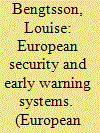

|
|
|
|
|
| Summary/Abstract |
This article critically examines a poorly understood aspect of the European security landscape: early warning systems (EWSs). EWSs are socio-technical systems designed to detect, analyse, and disseminate knowledge on potential security issues in a wide variety of sectors. We first present an empirical overview of more than 80 EWS in the European Union. We then draw on debates in Critical Security Studies to help us make sense of the role of such systems, tapping into conceptual debates on the construction of security issues as either “threat” or “risk” related. Finally, we study one EWS – the Early Warning and Response System for infectious diseases – to understand how it works and how it reconciles risk – versus threat-based security logics. Contrary to assumptions of a clear distinction between risk- and threat-based logics of security, we show that EWSs may serve as a “transmission belt” for the movement of issues from risk into threats.
|
|
|
|
|
|
|
|
|
|
|
|
|
|
|
|
| 2 |
ID:
158115
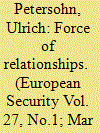

|
|
|
|
|
| Summary/Abstract |
Since the 1990s, military support and security services in hostile environments have been increasingly traded on the market for force. Surprisingly, how exchange is organised on the market for force remains predominantly focused on the neoclassical model, which assumes anonymous exchange, and sellers compete through price and quality of product for customers. However, the model seems to be incomplete as it describes some empirical patterns, yet not others. Why are service backgrounds clustered together and why do specific nationalities dominate the market in the Iraq and Afghanistan war? Why are they not distributed evenly as price and quality competition would suggest? The argument here is that social factors need to be taken in to account, i.e. personal relationships. The logic being that sellers and customers trade through existing relationships, and familiarity is the dealmaker, rather than price. The article takes on the challenge to develop a sociological conceptualisation of the market able to integrate both logics. Finally, the approach is put to the test on the labour market for Western security operators. The results demonstrate that personal relationships play a significant role to explain exchange on the market for force, yet co-existence with the neoclassical logic.
|
|
|
|
|
|
|
|
|
|
|
|
|
|
|
|
| 3 |
ID:
158110
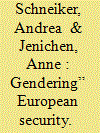

|
|
|
|
|
| Summary/Abstract |
The Organisation for Security and Co-operation in Europe (OSCE) has rarely been considered in scholarship on gender and security, even though it was one of the regional security organisations whose gender policy predated the United Nations Security Council’s call for more international attention to issues related to women, peace and security in October 2000. Based on an analysis of official OSCE documents and on semi-structured interviews, we trace the integration of gender issues in the OSCE and explore the rationale behind and the challenges associated with it. We identify two phases of gender policy change in the OSCE and show how the integration of UNSCR 1325 brought about an expansion of OSCE gender policy from an exclusive focus on “soft” security issues towards increased inclusion of gender in the area of “hard” security. Drawing on historical and feminist institutionalism, we argue that reform coalitions were crucial for the policy changes in the OSCE but that they encountered institutional and ideational barriers, which hampered implementation of the gender policy. In light of rising opposition, our analysis warns of a backlash that might jeopardise current achievements.
|
|
|
|
|
|
|
|
|
|
|
|
|
|
|
|
| 4 |
ID:
158113


|
|
|
|
|
| Summary/Abstract |
At a time when calls for German leadership abound, we need to ask what kind of leadership Berlin is likely to offer. This paper builds on scholarship that presumes identity as an essential precondition for orderly social life. My focus is on how identity is secured through ontological security-seeking. Ontological security theory reveals how Germany is responding to rising calls for leadership in Europe and beyond and traces these responses to an increasingly stressed identity narrative. It explains both Germany’s reluctance to lead and, being pressed to lead, how leadership is legitimated through discursive adaptation. Whether “leading from the center” or exercising “servant leadership”, ontological security theory exposes the specific interactions between a national self-narrative and a rapidly changing environment. I show how these interactions challenge Germany’s identity and its ability to adapt; how they cause ontological anxiety, and how the scope and direction of adaptation to structural change account for the kind of leadership Germany is able to offer. What we observe is a determined effort to position the country between a traditional culture of restraint that can no longer meet Germany’s responsibilities and a position of hegemony that speaks of self-serving behaviour and dominance.
|
|
|
|
|
|
|
|
|
|
|
|
|
|
|
|
| 5 |
ID:
158114
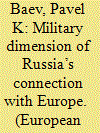

|
|
|
|
|
| Summary/Abstract |
The Russian challenge to the European security system is internal rather than external, because despite all the political efforts at distancing Russia from Europe, the indivisibility remains undiminished. The underlying assumption for Russia’s course is that the West is in irreversible decline, and the conclusion about the dissolution of the West-controlled world order is established in the key doctrinal documents. Instead of passively waiting for this meltdown to develop, it makes perfect sense for the Russian leadership to accelerate it pro-actively, using various levers, including military force. Moscow acts on the assumption that its “unconventional” methods could yield results only if augmented by military threats, against which the Europeans cannot master convincing counter-argument. The imperative to sustain and update credibility of these threats necessitates allocation of greater share of available resources to military build-up, which clashes with economic rationale of reducing this burden in the situation of protracted stagnation.
|
|
|
|
|
|
|
|
|
|
|
|
|
|
|
|
| 6 |
ID:
158112
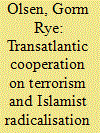

|
|
|
|
|
| Summary/Abstract |
Transatlantic cooperation on security has a long history. In Africa, transatlantic cooperation on security is basically between France and the United States. This paper asks why the two former competitors in Africa started to cooperate and also why they are so willing to engage militarily. The central argument in this paper poses that France and the US cooperate because it is indispensable to both parties. To France, the cooperation is indispensable because the US is the only power with sufficient financial means and with sufficient air-lift capacity to transport French and African troops into conflict-ridden countries. To Washington, cooperation with Paris is indispensable because the French authorities have unique access to intelligence and knowledge about large parts of Africa. By applying a foreign policy analysis framework, the paper analyses how perceptions of decision-makers, the role of personality and leadership, the role of government institutions and political systems have impacted the relevant decisions. It is emphasised that the two different decision-making systems – the French “state dominated” and the American “society dominated” – produce the same result, namely collaboration. It suggests that the perception of a serious threat from terrorism and Islamist radicalisation overrules differences in decision-making systems.
|
|
|
|
|
|
|
|
|
|
|
|
|
|
|
|
|
|
|
|
|